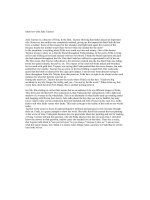Freedom to communicate interview with thomas malone, MIT sloan school of management
Bạn đang xem bản rút gọn của tài liệu. Xem và tải ngay bản đầy đủ của tài liệu tại đây (1.02 MB, 2 trang )
Freedom to communicate
The falling cost of communication is disrupting
conventional hierarchies of control
In the last 20 years, communications technology has become abundant and
pervasive. This has changed forever the flow of information between people. Today,
it is possible to share within seconds- quantities of data and information that not
long ago would have required access to expensive, centralised infrastructure.
Information is power, to a degree, and this democratising of communications has
brought with it a distribution of control. As Thomas Malone, the Patrick J. McGovern
Professor of Management at the MIT Sloan School of Management, explains in this
interview with The Economist Intelligence Unit, cheap access to information allows
more people to make decisions for themselves.
In business, Professor Malone believes, the continued decline in communication
costs will further empower workers to act autonomously. That calls for new
approaches to management and, perhaps, new kinds of organisations that provide
some of the social benefits currently offered by conventional businesses.
This interview is part of an investigation into the future of work by The
Economist Intelligence Unit, sponsored by Ricoh Europe. For more, visit
/>
The EIU: Which IT trend will have the greatest impact on the way we work over the next
10-15 years?
Thomas Malone
MIT Sloan School of
Management
Professor Malone: The most important thing will be the falling in cost of communication. This will
make it easier for people to communicate and coordinate their work in much larger groups and
over much longer distances.
Will this be driven by new communications technology?
Certainly, new technologies will develop. They will get closer to the perfect ideal of free, instant,
anywhere, anytime, any-kind of information, and we will probably get more interesting tools for
things like videoconferencing. But the basic technologies are already here.
What we need are new ways of thinking about organising our work. We are in the early stages of an
increase in human freedom in business that may in the long run be as important as democracy was
for governments.
Why is it such an important change?
It’s now possible to have both the economic benefits of very large organisations— such as
economies of scale—and the human benefits of small organisations, such as creativity, motivation,
and flexibility. It has been cheap communication that made that possible. It means that huge
numbers of people, even in very large organisations, have enough information to make intelligent
S P O N S O R E D B Y:
decisions for themselves, instead of just following orders from someone above them in a hierarchy
that supposedly knows more than they do.
And when people are making their own decisions rather than following orders they are often more
highly motivated, more dedicated, more creative, more innovative, and more flexible.
How is this trend manifesting itself today?
In some cases, it’s manifested in what you might call ‘loose hierarchies’. Companies are moving
from the strict ‘command-and-control’ hierarchical structures that were perfected in the 20th
century to become more network-style organisations. There may still be a boss and chains of
command, but more people in the organisation have the freedom to make more decisions for
themselves.
Another example is the way that work is now being done across company boundaries in ways that
are more networked and decentralised. An example of that would be eBay, which is not just an
auction company but a giant retailing organisation. However, most of the functions of retailing are
not done by eBay the company; they are done by eBay the community, and more particularly, by
all of the independent sellers who sell their wares over the eBay infrastructure. In that sense, eBay
as a company has provided an infrastructure which a very decentralised network of independent
sellers who act collectively as a very large retailing organisation.
We are in the early
stages of an increase
in human freedom
in business that
may in the long run
be as important as
democracy was for
governments.
Thomas Malone
MIT Sloan School of
Management
Are there any downsides to this trend for employees or organisations?
There are potential downsides, yes. For example, if you’re a freelance worker in a decentralised
organisation, where do you get the benefits that traditional companies provide for their
employees? When do you get an opportunity to socialise with other people? Where do you get
opportunities to learn and develop your skills, to build your reputation, to get a sense of identity?
One solution is to have an independent organisation whose job it is to provide these kinds of
benefits to independent workers. You could call these types of organisations hubs or societies, but
my colleagues and I like the term “guilds”, harking back to the craft guilds. These guilds might
offer its members training, opportunities to socialise, help finding work, or even some sort of
unemployment insurance, so that if you pay a percentage of your income in the good times you
might get a guaranteed minimum income in the bad times.
How should firms ready themselves for this future way of working?
One of the most important changes needed is a change in our mindset. Many of us today still have
what my colleague at MIT, Mike Resnick, calls the centralised mindset. We assume that if there’s
a problem the best way to solve it is to put someone in charge, to have a hierarchy, to have an
organisation responsible for solving that problem.
In the future, we will need to change our view of the role of management from ‘command and
control’ to ‘coordinate and cultivate’. This is not necessarily the opposite of command-andcontrol, but it allows for the whole spectrum of possibilities from top-down centralised control,
in some cases, to bottom-up facilitation in others. And I believe the managers and leaders who
will be most successful in this new world will be those who can adapt their management style as
appropriate to the circumstances.
S P O N S O R E D B Y:









